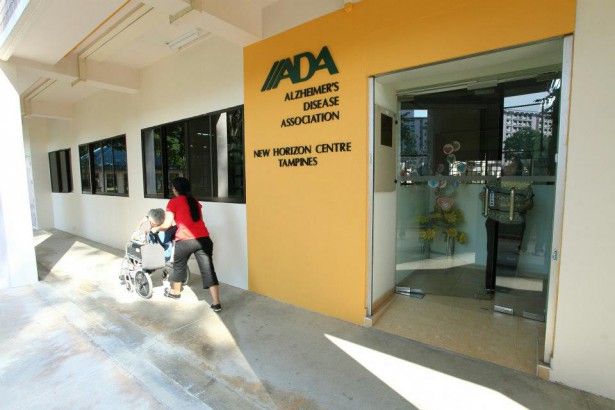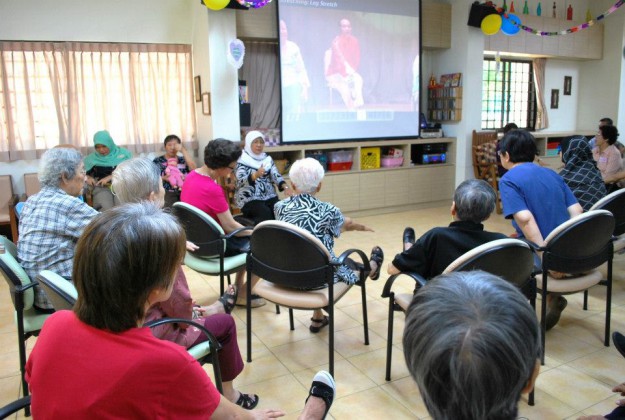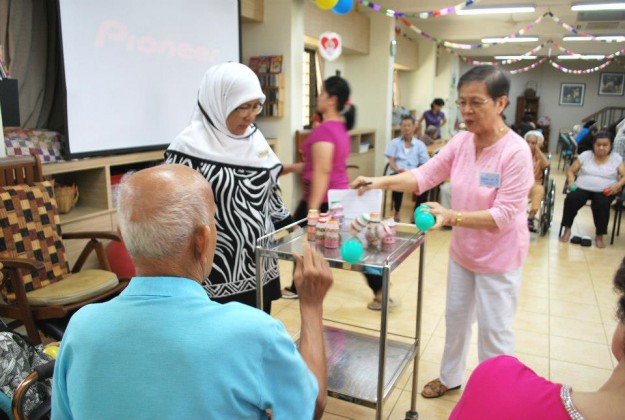Charity of the Month: The Alzheimer's Disease Association in Singapore
mis à jour le 6 October 2015 à 23:21
What is dementia? How does it affect the person suffering from it and his/her surrounding? Find out all the answers and how you too can help through our Q&A with the ADA in Singapore.
So much has been said about Alzheimer ’s disease lately, whether through general awareness campaigns, recent conducted studies or even the entertainment world. Take for example the movie Still Alice, in which actress Julianne Moore gives a haunting performance as a linguistics professor suffering from dementia. Following Alice - as she gets diagnosed with early signs of the disease which progress and become more evident throughout the movie - is an unforgettable experience and especially one specific controversial line which she utters when she finds out her fate: ‘I wish I had cancer (instead)’.
A strong and seemingly unfair comment at the beginning, it does however reflect our growing fears of developing dementia in real life. Case in point is a recent study conducted on people over 55 years of age in the UK, which showed that more people (30%) were scared of developing dementia as they age than any other - and more killer - diseases such as strokes, heart disease and even cancer.
By why is that you ask? Well, mainly because unlike cancer and other physical diseases, dementia robs a person from his/her memories which make up their identities and establish the connection they have with their families, friends and surroundings.
While as a film Still Alice shows that to a certain extent – we reached out to Alzheimer’s Disease Association in Singapore who explained to us more about the realities of the disease, how it affects people specifically in Singapore and ways to help out their cause.
1- Can you tell us more about the Alzheimer's Disease Association and its foundation?
The Alzheimer’s Disease Association (or ADA), is a voluntary welfare organisation (ie, a charity) set up in 1990 by a group of doctors and volunteers who had noticed a rising trend in elderly persons losing their way home or who had been abandoned by their families. These elderly people were suffering from one of the more than 10 types of brain deterioration grouped under the term dementia, of which Alzheimer's Disease forms 70%.
Dementia was not well known at the time, and the public thought that it was just a normal part of ageing and becoming “senile”. ADA was hence set forth to raise awareness that dementia and Alzheimer’s are not really a normal part of ageing, and that persons with dementia could benefit from better management of the disease.
Along with other mental illnesses such as schizophrenia, dementia was a stigma associated with "poor genes" and "pure bad luck". Dementia also marked the end of hope for a person, and their family members and even the medical establishments were helpless in the management of the disease as it deteriorated. ADA's founding members knew from their experience and readings that dementia was a misunderstood illness, and that with better knowledge, empathy and support, both the patients and their caregivers would be less stressed and would suffer less from the societal stigma.
Thus, ADA’s first of four dementia day care centres, branded under the moniker “New Horizon” was born in Toa Payoh Central. Soon, the remaining three New Horizon Centres were set up in Bukit Batok, Jurong Point and Tampines. Long before today's hospices and senior care centres started incorporating specialised wards for dementia, ADA was already the only healthcare charity specialising in dementia care. Not just providing care for persons with dementia, but also care for caregivers (family members, healthcare professionals, social workers, domestic helpers, etc.).
As of 2015, ADA also runs two smaller centres (in Bendemeer and Tiong Bahru areas) that cater to families with specific needs not met by mainstream day care or home care facilities. We also run a weekday telephone helpline to provide information and referrals to callers who wish to tap our knowledgebase.
This year, ADA celebrates its Silver Anniversary, having been in operation for 25 years and establishing itself as the most-specialised charity for dementia-related matters in Singapore. Many hospitals and eldercare agencies are scampering to set up more provisions for elderly with dementia, and ADA is well poised to share its deep knowledge and skills base with these agencies in as far as non-clinical management aspects are concerned.
2- What type of work do you do (diagnosis, caretaker service, etc...)?
ADA is the only charity specialising in non-clinical dementia care and support. “Non-clinical” means that ADA does not administer medical treatment, diagnosis or any form of medical care that a clinic or hospital handles. That is the reason why ADA does not refer to persons with dementia as "patients", but as "clients".
Dementia care refers to the day care services we provide for persons with dementia, while dementia support refers to the training, guidance and emotional support we offer to caregivers managing dementia. Since ADA does not offer clinical care for dementia, what kind of therapy is actually involved? The answer is psycho-social and physical care.
Physical care refers to rehabilitative care, physiotherapy and general exercise to help elderly persons with dementia to stay active and mobile, or at least maximize whatever physical abilities are still intact.
Psycho-social care refers to the psychological and social stimulation that a person with dementia needs to stay mentally active and engaged with people and their environment. By keeping the mind active, engaged and at peace (rather than confused, troubled and unfocused), we can slow down the rate of inevitable mental decline, while maximising whatever cognitive abilities that a person still possesses.
As for families or persons who cannot benefit from day care for one reason or another, ADA also offers home-care services. Trained personnel called “eldersitters” together with counsellors and social workers can visit home premises to help caregivers to cope with their heavy responsibilities or simply take over their duties for a while so that the caregivers can take a much-needed break.
Besides providing care for persons with dementia, ADA also supports caregivers. Whether they are family members, nurses, foreign domestic helpers or healthcare personnel such as occupational therapists and nursing aides, ADA offers a rich menu of programmes to help them to be better caregivers; to help them care for their own well-being despite the challenges; and to provide resources and referrals to our network to help them help themselves while availing continual support as their needs and concerns change over time.
Finally, ADA also has a mission to constantly engage society to spread proper awareness of the disease. We say "proper awareness" because some people as misinformed about dementia and their caregiving decisions can be misguided. Some assumptions, stigma and biases can also cause caregivers to think they are doing the best they could for their loved one with dementia, but in reality, a much wider range of humane options remain to be explored.
3- Alzheimer's disease has been talked about more recently, do you think people are now more aware of it as a disease than before?
Yes, incidences of Alzheimer’s Disease as well as dementia in general have been increasing sharply worldwide over the past decades. Governments are deeply concerned, while low birth rates and ageing populations are serious problems plaguing many countries. Singapore is no exception, and with the strong impetus by government, together with ADA’s constant drive to raise awareness, dementia is now less mystifying to the public. What people used to call “second childhood” or “senility” is now understood to be an abnormal form of ageing. This puts dementia in a different light – from one of hopelessness to one of manageability. Once mindsets are changed for the better, empathy, societal inclusiveness and governmental support will be enhanced.
4- What would you say is the hardest aspect of the disease?
Oftentimes, persons with dementia may not even be aware that they have dementia. They may not remember their strange behaviour or mood swings or violent outbursts and paranoia that drive their family crazy. In fact, caregivers are the people who suffer the brunt of the disease’and its impact the most.
If the disease (and the various stages of deterioration and symptomatic changes that occur over time) is not well understood, and the caregiving challenges are not put in their proper perspective, we end up with families giving up hope and becoming emotionless as a defence. There are cases of families abandoning their loved one in a nursing home, or tying them down to stop them from wandering or causing problems at home. This in turn causes severe stress to the person with dementia, exacerbating the progress of the brain damage, and drastically affecting their general health. Thus, you can see that the group that suffers the most is also the group that can exert the most consequences to the person with dementia. But, if we can educate this group, help them to manage the problem with empathy and understanding, and also provide a network of support that they can rely on to help one another, the problem can become less hopeless and more manageable.
Then, from the point of view of a person with dementia, some of the hardest aspects of the disease are almost never seen or experienced by the people around them. Stripped of the ability to make their own decisions. Treated as children by unenlightened caregivers. "Pampered" by people so that they are not allowed to do anything by themselves anymore. Constantly having one's preferences compromised for the convenience of one's caregiver(s). Losing mobility and dexterity to do what one wants to do when one wants it done. Being unable to express oneself appropriately when not receiving care in the way one prefers and so on.
5- Who do you work with normally and who brings them to the centre?
Usually, the spouse and family are the people who send their loved one with dementia to ADA for care.
This frees up some of their time so that they can lead their own lives as normally as possible. We do not operate on most weekends, however, as we want the caregivers to take up their share of responsibility to maintain family bonding. ADA also works with foreign domestic helpers who have been assigned to care for a person with dementia. An untrained helper can be shocked by how challenging it is to take care of someone with dementia. Many of them may just quit. With proper training from ADA, such workers will be able to cope better, and some even network with friends to spread awareness of dementia-care courses.

6- How many people in Singapore suffer from Dementia and how many on an average do you help?
As Singapore’s population ages, the number of people suffering from dementia is expected to rise. Based on ministry of health estimates, we currently have about 28,000 elderly aged 60 years and above with dementia, and this is expected to more than double to 80,000 by 2030. There are still many cases that are undiagnosed or unreported. A new trend is Young-Onset dementia, defined as cases occurring before age 65. The National Neuroscience Institute has embarked on pilot projects to investigate this phenomenon, but its studies show that people as young as 50 are starting to present with dementia. Worldwide, the projected rate of increase in dementia incidence is similar to that in Singapore. This effectively equates to one reported diagnosis of dementia somewhere in the world, every 4 seconds.
7- What can people in Singapore do to help ADA and people suffering from dementia in general?
People in Singapore can help by arming themselves with knowledge and then empowering society to push ahead with the fast pace of infrastructural adjustment needed to achieve three strategic goals:
a) Reduce individual risks of dementia in the future by encouraging the adoption of healthy lifestyles, taking preventive measures for those who are at risk, and bolstering early detection and intervention protocols to screen for those who are in a state of pre-dementia.
b) Increase the accessibility and awareness of world-class dementia-care resources to reduce the stigma; increase quality of personalised care and support (PCC); and ultimately have timely and appropriate avenues of help for anyone who needs it.
c) Accepting dementia as a common geriatric problem that can be managed well and integrated into every aspect of an inclusive society (as opposed to the current situation where many buildings and facilities are elder-friendly but not dementia-friendly) where every resident is a stakeholder and solution-provider rather than an obstruction or uncommitted bystander.
One last aspect of support that Singapore residents can provide in the fight to contain dementia is funding and volunteering.
When donating their time and money, the first thing that comes to many people's minds are the most visible causes such as cancer, animal rights and so on.
While these are definitely worthwhile causes, society can try to balance its philanthropic outreach so that the smaller charitable organisations can have more resources to work with.
8- Anything else you's like to add or anything else you think people should know?
Dementia can cause a person to lose much of his/her present and past, but it doesn't mean that we should write off the person's future. Hidden deep within the damaged neurons and cerebral matter are fragments of the former self of that person. Given proper care and love, a person with dementia will still be able to live with dignity and peace, and also allow the people who care for him/her to similarly preserve their dignity and peace. Instead of focusing on what a person with dementia has lost, we can focus on what remaining abilities and identity a person still has. Building on these attributes and offering the person our empathy, love and understanding are what constitute Person-Centred Care.
ADA hopes that the PCC momentum will eventually lead to the formation of a truly dementia-ready and dementia-friendly nation by SG75.
for more information about the Alzheimer's Disease Association in Singapore and to help support their cause, please visit their website.
Rana Wehbe
Photos: Alzheimer's Disease Association (ADA) Singapore facebook page.




